
JMIR Public Health and Surveillance
Scope & Guideline
Connecting researchers and practitioners for a healthier world.
Introduction
Aims and Scopes
- Digital Health and Surveillance Technologies:
The journal consistently publishes articles on the development and application of digital health technologies, including mobile health apps, telehealth, and online surveillance systems, to monitor and respond to public health issues. - Epidemiological Studies and Public Health Interventions:
A core area of focus is the epidemiological assessment of diseases, particularly in the context of public health interventions and the evaluation of their effectiveness in controlling outbreaks and improving health outcomes. - Health Behavior and Attitudes:
Research on health behaviors, attitudes, and their determinants is a recurring theme, exploring how social, economic, and cultural factors influence public health practices and vaccination uptake. - Global Health Perspectives:
The journal emphasizes a global perspective, publishing research that examines public health issues from various geographical contexts, highlighting disparities and the need for tailored interventions. - COVID-19 and Emerging Infectious Diseases:
Given the recent global pandemic, there is a significant focus on COVID-19-related research, including surveillance, vaccination strategies, and the impacts of public health policies.
Trending and Emerging
- Telehealth and Remote Monitoring:
The adoption of telehealth has surged, with numerous publications exploring its effectiveness and user acceptance during and post-COVID-19, emphasizing the shift towards remote healthcare solutions. - Data-Driven Public Health Interventions:
Emerging research highlights the use of big data, machine learning, and artificial intelligence in public health surveillance and intervention strategies, indicating a trend towards data-driven decision-making. - Social Media and Health Communication:
Studies investigating the role of social media in health communication, misinformation, and public engagement have increased, reflecting the significance of digital platforms in shaping health behaviors. - Mental Health and Well-being:
There is a growing focus on mental health, particularly in the context of the COVID-19 pandemic, with research addressing the psychological impacts of public health measures and the importance of mental health support. - Vaccine Hesitancy and Acceptance:
Research on vaccine hesitancy, particularly in relation to COVID-19, has emerged as a prominent theme, as understanding public attitudes towards vaccination becomes critical for health strategies.
Declining or Waning
- Traditional Epidemiological Methods:
There is a noticeable decrease in the publication of studies relying solely on traditional epidemiological methods without the integration of digital tools or novel data sources, indicating a shift towards more innovative approaches. - Chronic Disease Management:
Research specifically focused on chronic disease management, including diabetes and cardiovascular diseases, appears to be less frequent, possibly overshadowed by the urgency of addressing infectious disease outbreaks. - Local or Community-Level Studies:
The journal has seen fewer studies focused exclusively on localized health issues or community-level interventions, as the broader, global health narratives and digital health approaches gain more attention.
Similar Journals
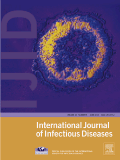
INTERNATIONAL JOURNAL OF INFECTIOUS DISEASES
Elevating the discourse on infectious disease science.INTERNATIONAL JOURNAL OF INFECTIOUS DISEASES, published by ELSEVIER SCI LTD, stands as a leading platform in the realm of infectious diseases, contributing significantly to the global understanding of this critical field. With an impressive impact factor, the journal maintains a distinguished Q1 ranking across various categories, including Infectious Diseases, Medicine (miscellaneous), and Medical Microbiology, demonstrating its high relevance and influence among contemporary research. Since its inception in 1996, it has embraced an Open Access model, allowing for wider dissemination of essential research findings that can inform public health policies and clinical practices. With a commitment to advancing scientific knowledge, this journal is not only a vital resource for researchers and professionals but also serves as an invaluable educational tool for students interested in the complexities of infectious diseases and their management. For those looking to stay at the forefront of research and innovation in this field, the INTERNATIONAL JOURNAL OF INFECTIOUS DISEASES is an indispensable resource.

Vaccine: X
Elevating public health through innovative vaccine solutions.Vaccine: X, published by Elsevier, is a premier open access journal dedicated to advancing research in the interdisciplinary fields of immunology and microbiology, infectious diseases, molecular medicine, and public health. With an ISSN of 2590-1362 and operating since 2019, the journal has rapidly established an influential role, achieving Q2 rankings in major categories such as Immunology and Microbiology, Infectious Diseases, and Public Health for 2023. Its commitment to disseminating cutting-edge research is evident from its broad scope, focusing on innovative vaccines and therapies that are critical for global health. Researchers and professionals will find value in the accessible nature of the journal, which has been recognized for its contributions to veterinary medicine as well, with a Q1 ranking in the miscellaneous veterinary category. The journal proudly showcases high-quality, peer-reviewed articles and welcomes submissions that push the boundaries of current knowledge, making it an essential resource for anyone involved in vaccine research and development.

Eurosurveillance
Shaping the future of infectious disease response.Eurosurveillance is a prestigious journal dedicated to the field of epidemiology, public health, and infectious diseases, published by the European Centre for Disease Prevention and Control since 1996. With an impressive Q1 ranking across various categories, including Epidemiology and Public Health, it consistently stands at the forefront of research dissemination, making it an invaluable resource for researchers, professionals, and students alike. The journal boasts an outstanding reputation, as evidenced by its Scopus rankings, where it ranks in the top 1% to 3% in multiple relevant categories. As an Open Access publication, Eurosurveillance ensures that vital findings are freely accessible to a global audience, fostering collaboration and innovation in the fight against infectious diseases. With a dedicated reach from 2001 to 2024, the journal addresses contemporary challenges in public health and virology, reinforcing its significance in shaping policies and research initiatives across the world.
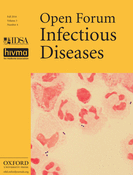
Open Forum Infectious Diseases
Empowering global health through accessible science.Open Forum Infectious Diseases (ISSN: 2328-8957; E-ISSN: 2328-8957) is a leading open-access journal published by Oxford University Press, dedicated to advancing the field of infectious diseases. Since its inception in 2014, the journal has provided a platform for researchers to disseminate impactful findings in a rapidly evolving domain, achieving a remarkable Q1 ranking in both the Infectious Diseases and Oncology categories as of 2023. The journal encourages rigorous and innovative research, contributing significantly to global health discussions and informing best practices in clinical settings. As an open-access journal, it ensures that its content is accessible to a wide audience, fostering collaboration and knowledge sharing among researchers, professionals, and students alike. Positioned in the heart of the United States, Open Forum Infectious Diseases serves as a critical resource for the academic community, and its continued commitment to quality and relevance secures its status as an essential publication in the field.
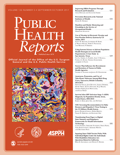
PUBLIC HEALTH REPORTS
Elevating public health discourse since 1945.PUBLIC HEALTH REPORTS is a premier journal in the field of public health, published by SAGE PUBLICATIONS INC in the United States. With its ISSN 0033-3549 and E-ISSN 1468-2877, this esteemed publication has been an influential voice in the discipline since its inception in 1945. Recognized for its rigorous scholarship, it currently holds a distinguished Q1 ranking in the 2023 category of Public Health, Environmental and Occupational Health, emphasizing its significance with a Scopus rank of #186 out of 665, placing it in the 72nd percentile. The journal aims to disseminate high-quality research that addresses pressing health issues and promotes evidence-based practices, making it a vital resource for researchers, professionals, and students alike. Although it is not an open-access journal, PUBLIC HEALTH REPORTS continues to offer extensive insights and advancements pertinent to the global public health landscape, thereby fostering a deeper understanding and engagement with critical health determinants. Researchers and health practitioners are encouraged to contribute to this dynamic forum where knowledge and innovation converge.
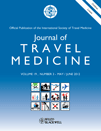
JOURNAL OF TRAVEL MEDICINE
Championing Public Health in the Era of Global MobilityJOURNAL OF TRAVEL MEDICINE, published by Oxford University Press Inc, is a preeminent scholarly journal dedicated to the field of travel medicine. With an impressive impact factor and a remarkable ranking in the Q1 category across multiple disciplines including Infectious Diseases, Public Health, and Environmental and Occupational Health, this journal is pivotal for researchers, healthcare professionals, and students interested in the complexities of health risks associated with global travel. It has maintained its rigorous academic standards since its inception in 1994, continuing to serve as a vital resource and platform for disseminating innovative research, case studies, and reviews that address emerging challenges in travel health. With a strong commitment to advancing public health knowledge, the JOURNAL OF TRAVEL MEDICINE fosters dialogue and collaboration among the global research community and contributes significantly to evidence-based practices in the field. For those interested in cutting-edge findings and developments, this journal remains an essential source of information and guidance.

MMWR-MORBIDITY AND MORTALITY WEEKLY REPORT
Transforming Health Insights into ActionMMWR-Morbidity and Mortality Weekly Report, published by the Centers for Disease Control and Prevention (CDC), stands as a preeminent journal in the fields of epidemiology, health information management, and public health. With an impressive reputation bolstered by an H-index reflecting its influence, MMWR is recognized as a Q1 journal as of 2023 across multiple health-related categories. Given its ranking in the 99th percentile among its peers, it provides critical insights and reports that shape health policy and practice globally. The journal is accessed freely by the research community, ensuring that key findings related to morbidity and mortality are widely disseminated and utilized. Established in 1981 and continuing through to 2024, MMWR remains an essential resource for researchers, health professionals, and students dedicated to understanding and combating health issues in the United States and beyond. Its ongoing contributions to the public health dialogue illustrate the journal's pivotal role in promoting health awareness and safety.

Lancet Regional Health-Western Pacific
Advancing Health Insights Across the Western PacificLancet Regional Health-Western Pacific is a premier academic journal published by Elsevier, focusing on the diverse and dynamic field of health in the Western Pacific region. With an impressive Q1 ranking across several vital categories such as Geriatrics and Gerontology, Health Policy, Infectious Diseases, and Public Health, this journal is positioned at the forefront of health research and policy development. The journal aims to provide a platform for innovative research, reviews, and opinion pieces that lead to improved health outcomes and influence health policy across this geographically and culturally rich area. Offering open access to its content, Lancet Regional Health-Western Pacific ensures that the latest findings are readily available to researchers, professionals, and policymakers alike, ultimately contributing to the global discourse on health issues. As it continually strives to maintain rigorous publication standards, the journal serves as a crucial resource in promoting evidence-based practices and driving advancements in public health.

Clinical Epidemiology and Global Health
Championing open access to vital health insights.Clinical Epidemiology and Global Health, published by Elsevier - Division Reed Elsevier India Pvt Ltd, is a leading open-access journal dedicated to the dissemination of research in the crucial fields of epidemiology and global health. With an ISSN of 2452-0918 and an E-ISSN of 2213-3984, this journal has been a platform for innovative studies since its inception in 2013, converging into a comprehensive resource through 2024. Operating from the Netherlands and ensuring accessibility from anywhere in the world since its transition to an open-access model in 2021, it fosters the global exchange of knowledge. The journal's impact is reflected in its current quartile rankings, including Q2 in Public Health, Environmental and Occupational Health and Q3 in Epidemiology, Infectious Diseases, and Microbiology. With a growing reputation bolstered by SCOPUS rankings that place it in the top percentiles, Clinical Epidemiology and Global Health stands as an essential resource for researchers, professionals, and students dedicated to advancing public health and epidemiological research.
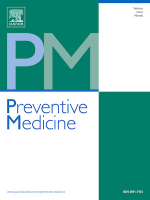
Preventive Medicine
Fostering evidence-based practices in preventive medicine.Preventive Medicine is a premier academic journal published by Academic Press Inc Elsevier Science, renowned for its influential contributions to the fields of Epidemiology and Public Health. Since its inception in 1946 and through its dedicated issues leading into 2024, the journal has established itself as a leading platform for cutting-edge research, boasting impressive Scopus rankings, with a notable Q1 status across relevant categories. This journal provides an essential forum for scholars, practitioners, and policy-makers interested in the prevention of diseases and the promotion of health within populations. With each issue, it disseminates valuable insights on preventive strategies, health behaviors, and epidemiological trends, making it crucial for anyone invested in the advancement of public health sciences. The journal does not offer open access options, ensuring that content remains relevant and targeted to its scholarly audience. Given its valuable contributions and recognition in the academic community, Preventive Medicine continues to play a pivotal role in shaping evidence-based approaches to health promotion and disease prevention in modern societal contexts.